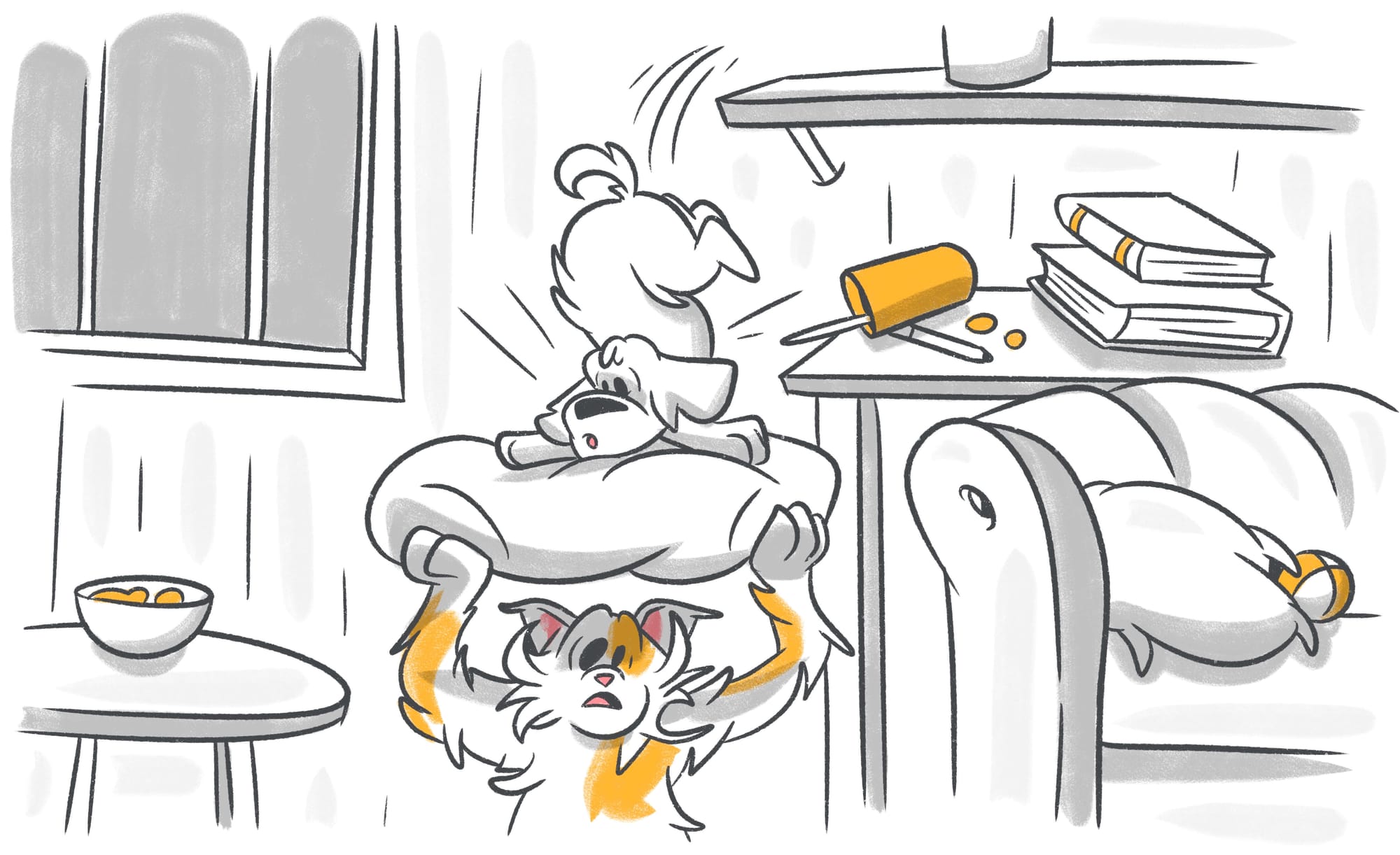Welcoming a new puppy into your home is an exciting experience, often filled with joy and anticipation. However, for many new pet owners, the initial elation can soon give way to a lesser-known phenomenon called the "puppy blues."
From the euphoria of bringing home an English Bulldog or a playful Husky to the daunting realization of the responsibilities that come with a new furbaby, the journey can be unexpectedly emotional. But what exactly are the "puppy blues," and how does it affect new dog parents?
Stop Googling - Ask a Real Vet
Content:
- What are the Puppy Blues
- Signs You May Have the Puppy Blues
- How Long Can the Puppy Blues Last
- How to Deal With Puppy Blues
- FAQs
- Conclusion
What are the Puppy Blues
The term "puppy blues" refers to a state of emotional distress or anxiety that some new pet owners experience after bringing a puppy home. It's akin to the feeling of being overwhelmed, underprepared, or doubtful about one's ability to care for a new pet. This condition is not limited to specific breeds or people; it can affect anyone who has recently added a puppy to their household.
The puppy blues often arise from the sudden (often unexpected) shift in lifestyle that comes with caring for a puppy. The Journal of Social Psychology study do show that there are significant psychological effects of dog ownership.
Although most of them are positive, this is not always the case. Sleepless nights, constant vigilance, and the puppy’s demands can take a toll on anyone, a bit like post-partum depression in new mothers. Recognizing that these feelings are normal and temporary is crucial to managing them.
One important point to note is that research shows the “puppy blues” are connected to the struggle of striving to be a “good guardian.” So while it can be tough to experience, having these negative feelings may be a sign that you are a good pup parent and that you are striving to do your best for your dog’s welfare.
Years ago, I experienced the puppy blues firsthand with my Bouvier De Flandres puppy named Jeremy. After the initial excitement wore off, I found myself struggling. Jeremy wasn’t motivated by traditional training methods, which made it challenging for him to train. This, combined with personal and work-related stress, left me feeling overwhelmed and underequipped.
The difficulty of potty training and establishing a routine with Jeremy led to serious self-doubt. I questioned whether I was the right owner for him and even considered rehoming as an option. It was a tough period where I had to confront my expectations and find a new way to bond with him. I had the puppy blues. But what are the signs that you may have them too?
Signs You May Have the Puppy Blues
Recognizing the symptoms of the puppy blues is the first step towards addressing them. Here are some common signs that you might be experiencing this emotional state:
Overwhelming Anxiety
Constant worry about the puppy’s well-being, even when they are safe.
Fatigue and Exhaustion
Feeling unusually tired, primarily due to disrupted sleep patterns or the constant vigilance puppies require.
Frustration or Irritation
Feeling easily annoyed or frustrated with your puppy’s normal behavior, like chewing or barking.
Regret or Doubt
Questioning your decision to get a puppy or doubting your ability to care for them properly.
Sadness or Depression
Experiencing unexplained sadness or a feeling of being emotionally overwhelmed. It’s also common to feel like you are “failing” your puppy, that they may be better off with someone else, or that you don’t have the energy to meet their needs, such as going for walks or having playtime.
Isolation
Feeling like you can't leave the house or engage in usual activities due to the demands of puppy care. You may also feel too exhausted to engage in normal social activities.
Change in Appetite
Experiencing a significant increase or decrease in appetite is often linked to stress.
Coping with Puppy Blues
In times of overwhelming anxiety or when you need a break, technology like the Petcube Camera can be a lifesaver. This innovative device allows you to monitor your puppy remotely, offering peace of mind when you're away from home or just need some space. The Petcube Camera features include:
- 24/7 Live Video Streaming: Watch your puppy anytime from your smartphone, giving you a sense of control and connection.
- High-Quality Video: The camera’s 1080p HD quality ensures you can see your puppy’s activities and environment.
- Two-Way Audio: Communicate with your puppy, offering comfort to both you and your pet.
- Motion and Sound Alerts: Stay informed about your puppy's movements and noises, which is particularly helpful in monitoring their behavior and health.
Using a tool like the Petcube Camera can help mitigate some symptoms of the puppy blues by ensuring your puppy is safe and secure, even when you're not physically present. It offers a practical way to balance the need for personal space with the responsibilities of puppy care, ultimately helping to alleviate some of the stress and anxiety associated with new pet ownership.
Remember, experiencing the puppy blues is normal, and with time, patience, and the right tools, you can overcome these challenges and enjoy the rewarding journey of raising a puppy.
How Long Can the Puppy Blues Last
The duration of the puppy blues can vary greatly from one person to another. Generally, these feelings may last from a few weeks to several months. The timeline largely depends on several factors, including the individual's circumstances, their puppy’s behavior and needs, and the level of support they receive.
Typical Puppy Blues Timeline
- Initial Weeks: The first few weeks can be particularly challenging as you and your puppy adjust to each other.
- Gradual Improvement: As routines are established and you become more accustomed to your puppy's needs and behavior, the intensity of these feelings often diminishes. There is often a lot of relief when your puppy starts sleeping through the night or after the potty-training and teething stages are over.
- Variable Duration: For some, the puppy blues may resolve relatively quickly, while for others, it may take longer to adjust.
During this challenging period, tools like the Petcube Camera can be invaluable. Being able to check on your puppy remotely can provide reassurance and reduce anxiety, making it easier to manage the stresses of new pet ownership.
How to Deal With Puppy Blues
Dealing with the puppy blues involves a multi-faceted approach, encompassing professional support, practical solutions, and self-care strategies.
Seek Professional Psychological Help
If feelings of anxiety, sadness, or overwhelm are persistent and affecting your daily life, it may be time to seek professional psychological help. A mental health professional can provide strategies to cope with stress and anxiety, ensuring your well-being as you navigate the challenges of new pet ownership.
Utilize Puppy Daycare and Dog Sitters
Puppy daycare and dog sitters can provide a much-needed break, allowing you to rest or focus on other responsibilities. These services also offer socialization and stimulation for your puppy, contributing to their well-being.
Professional Trainers
Working with professional trainers can alleviate some of the stress related to puppy training. They can offer guidance on behavior management, making the training process more manageable and effective.
Reach Out to Friends and Family
Don’t hesitate to ask for help or support from friends and family members. Sometimes, just having someone to talk to or share the responsibilities with can significantly reduce stress.
Practice Self-Compassion
Be kind to yourself and recognize that feeling overwhelmed is a normal part of the process. Give yourself permission to experience a range of emotions and understand that it takes time to adjust to the changes a new puppy brings.
Alleviate Anxiety
Find ways to manage your anxiety, such as through mindfulness, exercise, or engaging in activities you enjoy. Having a routine and setting aside time for self-care can also be beneficial.
Petcube’s Emergency Fund
To alleviate anxiety about potential emergency vet bills and health concerns, Petcube’s Emergency Fund can be a valuable resource. This fund offers up to $3000 per year for up to six pets for pet emergencies, providing peace of mind in times of need.
Additionally, you have access to a 24/7 online vet service for first-aid guidance and emergency triage. For blog readers, there’s an exclusive offer of a 27% discount available here.
In my own experience, the turning point came when I adjusted my expectations and focused on Jeremy's strengths. Instead of traditional training methods, we bonded through play and activities like fetch. This approach not only helped improve our relationship but also provided much-needed relief from the overwhelming feelings I had been experiencing.
FAQs
What is the hardest stage of having a puppy?
The hardest stage of having a puppy often varies depending on the individual pet and owner. However, many find the initial few weeks or months particularly challenging. This period involves house training, teething, and early socialization, all of which require significant time, patience, and consistency.
Is it normal to feel depressed after getting a puppy?
Yes, it is normal for some people to feel depressed after getting a puppy. This feeling, often referred to as the "puppy blues," can be a reaction to the sudden change in routine and the added responsibilities of caring for a new pet. It's important to acknowledge these feelings and seek support if needed.
Is it normal to feel overwhelmed by a puppy?
It is quite normal to feel overwhelmed by a puppy. Puppies require a lot of attention, training, and care, which can be a significant adjustment from your previous routine. It's common for new pet owners to feel overwhelmed by the demands of puppy care, especially in the early stages.
Conclusion
Experiencing the puppy blues is a common, albeit rarely discussed, aspect of pet ownership. New pet owners need to know that these feelings are normal and can be managed with time, patience, and sometimes a shift in perspective. Seeking support from other pet owners, professionals, or online communities can also be immensely helpful. Remember, the journey with a new puppy, while challenging, can also be one of the most rewarding experiences.
Was this article helpful?
Help us make our articles even better









